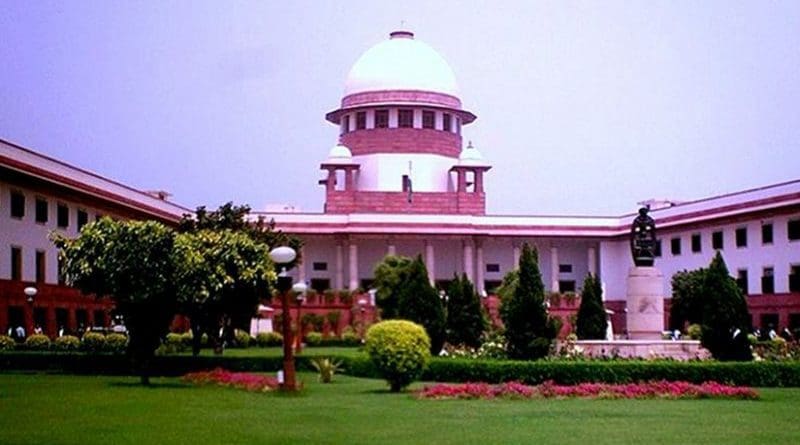Privacy And Fundamental Rights In India: Issue Blown Out Of Proportion – OpEd
A panel of nine judges of the Supreme Court of India have now given an unanimous decision that the right to privacy is a fundamental right and is essentially a natural right to every individual. The judges have said that it is indeed an inseparable and inalienable right for human beings. The judges have further said that fundamental rights are the only constitutional firewall to prevent the state’s interference with those core freedoms constituting the liberty of human being.
The judges have also opined that privacy includes at its core the preservation of personal intimacies, the sanctity of family life, marriage, procreation, the home and sexual orientation. Finally, the judges have conclusively pointed out that privacy also connotes a right to be left alone.
The above judgement of the Supreme Court has been widely welcomed in India and has been hailed as historic verdict of far-reaching significance.
While the above judgement has occupied considerable media space, cartoons are also appearing that a son refuses to show his grades to his parent claiming it to be a matter of fundamental rights and a subject of his privacy. The advocates of lesbian practices say that their sexuality is now a fundamental right for them. Next, prostitution will also be hailed to be a fundamental right. There are also demands that the government should not ask for any personal details from citizens such as fingerprints, photographs etc. which have been made mandatory by the government for issuing the Aadhaar card (identity card). The ridiculous arguments in defense of privacy go on endlessly.
In India, the demand for privacy and fundamental rights of individual citizens are being taken to such an extreme level that is not prevailing in any other country in the world, including the USA and Western Europe, which boast being the latest models of democracy.
Many well-meaning critics of Indian democracy often term the country as having a chaotic democracy, with demonstrations and protests on one issue or other having become the order of the day all over India. In a country of 1300 million people, often it is seen that a group of one thousand protesting people can bring any project or scheme to a standstill by demonstrating on public roads or obstructing traffic in busy thoroughfares. The government often adopts a tolerant attitude towards such protestors, viewing it as their fundamental and birthright to protest. Several well-meaning projects now remain stranded in India due to such protests by a minuscule percentage of the population.
There are critics who argue that India is paying too big a price for its nearly unrestricted freedom given to the people. It is also pointed out that Indian economic and industrial progress have considerably slowed down due to such excessive freedom. In spite of the fact that the Indian population has now reached and alarming level and is still continuing to increase at an unacceptable pace causing huge issues for the country, the government does not have the courage to force the population to adopt limited family norms. China, a country not known for freedom for people, adopted a one child policy and brought the population surge under control that has benefited China. In the atmosphere of freedom in India, this cannot be done.
The unanimous judgement given by the Supreme Court of India in favor of privacy may lead to a situation that the power and authority of government may be severely restricted in implementing policies and programs that are urgently needed for the progress of India.
It remains to be seen that after pronouncing such unanimous views, whether the Supreme Court judges will clarify that even while granting the fundamental rights of privacy, the freedom for individuals cannot be absolute and has to be curtailed when it is a matter of national need or security is required. While the judges have made some vague observations on these lines, they are yet to put down their views very clearly, so that “the freedom lovers” will not go astray.
The judges have to clearly say that liberty is not a personal affair, but a social contract. It is an adjustment of individual interests. While one has the liberty to play piano with high volume in the middle of the night, he cannot do this while disturbing the sleep of his neighbor. Will the “freedom lovers” in India realize this?
After experimenting for 70 years with democracy after Independence, there probably is a strong case for a controlled democracy in India, as different from the free-run democracy that the country has hitherto seen.
All said and done, the privacy and fundamental right issue in India is blown out of proportions, and that threatens to mar the progress of India.


The above article is the perfect analysis of the anarchic democracy and consequent chaos prevailing in the country. If ten fishermen families can stop a vital road construction to the Port in the country for years isn’t it time to think whether such a democracy is needed at all. As prevalent all over the world the State needs to have details of all its citizens for effective administration as otherwise no social benefit measures can be effectively implemented and in these days security of the country and its citizens definitely need such data. Ideas can and need to be noble but have to necessarily satisfy the needs. Hope the wise judges will ponder over the issues in depth and take a considered decision. Krish